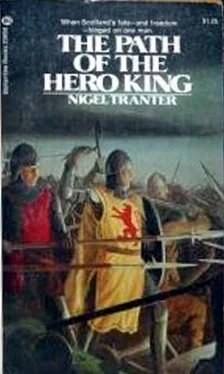The tactical situation was simple, astonishingly so considering the
large numbers of men involved. The huge English army was penned in an
enormous trap of level, pool-pitted and ditch-crossed swamp, with
islands of firm ground, hemmed in on three sides by the Bannock Burn,
the River Forth and the Pelstream Burn. The fourth side, to the west, where the ground lifted to the New Park escarpment, was now barred by the half-mile-long line of advancing Scots.
It was no charge, of course, even of infantry-the ground precluded that. Cut up with runnels and stan ks and sum ps draining into larger canals and ditches, it was terrain to be hopped and picked and sidled over, even by nimble men. For cavalry it was practically impassable, save by circuitous routes.
The English, of course, were not idle while this wholly unexpected attack on so broad a front was being mounted. Swiftly they were rallying, forming up into their troops, squadrons and companies. Already there was a distinct drift of mounted men southwards towards the entrance point to the cars eland of the night before. Then the drift turned to something more definite at the cavalry of the English extreme left, bivouacked nearest to the Milton of Bannock, achieved some sort of formation and began to hasten to gain and hold that vital bridgehead. First to enter, the night before, it was Gloucesters section of the van. Yesterdays misfortunes had hot quenched the young Earls eagerness. His great banner well to the fore, his trumpets braying, he was going to be first into action again.
But another and equally impatiently active earl was intent on gaining the same bridgehead-Edward, Earl of Carrick. For this very reason Bruce had given his brother the extreme right today.
Leaping, bounding, even using their. long pike-shafts as vaulting poles across the pows and ditches, the Scots foot raced for the bridge.
Gloucesters cavalry was grievously hampered by the terrain, though it was better here than elsewhere, as the English had pulled off the doors and roof-timbers of every building in the Milton and around to form little gangways and bridges across the ditches. But even so the horsemen had to twist, go slowly and most often in many single files. As a result, though a few reached the bridge first, they were isolated, and went down before the charge of the thrusting pike men By the time that Gloucester himself reached the scene, Edward Bruce had roughly formed his men into two schiltroms, side by side, at the bridge. There was no room, firm ground, for the English to pause and marshal their horsed ranks. Oncoming riders pushed earlier arrivals forward. Undoubtedly Gloucester would have formed up for a less piecemeal attack if he could; but like Clifford the day before the lack of firm ground gave no opportunity.
He and his men plunged at and circled the schiltroms disjointedly.
Gallantly impetuous yet, and an example to his men, the Earl plunged into the narrow gap between the schiltroms, hoping no doubt further to divide them. None of his people followed him therein, not even his standard-bearer. With a wild yell the pike men of the inner sides of both formations broke and surged towards each other, spears and dirks jabbing. Gloucesters horse went down, and its rider disappeared under the press.
Edward Bruce yelled also, not to kill, to save the Earl as prisoner, for his great ransom; but it was too late. Gilbert de Clare, nephew of King Edward and kinsman of the Bruces also, was dead, in the first minutes of the battle.
Unhappily his scattered cavalry drew back into the marshs safety.
All of this was not, of course, evident to the rest of the advancing Scots line; but that their right had had the best of it was clear, and greatly enheartened many. Bruce himself, though cheered, was otherwise preoccupied. As well as having to pick an awkward way for himself, like the others, across the shocking terrain that he had chosen to fight on, his primary concern at this stage was the menace of the English bowmen. Properly handled they could yet end everything. The enemy might in heavy cavalry he believed he had neutralised, by fighting here; but the archers …?
Bowmen, to be of real advantage in any battle, had to be massed, preferably on a flank and if possible on ground somewhat higher than the rest, where they could see, and enfilade the enemy without endangering their own ranks. The previous night Bruce had recognised all too clearly where, in this situation, the archers should be placed. Indeed, there was little choice. Well to the northwest of the English position, on their extreme right not far from where Moray had fought Clifford at the Pelstream ford, was an isolated hogback of slightly rising ground amongst the marsh. Here the bowmen could stand secure and do maximum damage. But, in fact, no archers stood there this morning; instead heavy cavalry occupied this key position, excellent for weighty horses admittedly, but quite useless tactically in that they could not move from it without plunging into soft bog again. There the pride of Englands chivalry was safe, but unserviceable. It had been the first magnet for Bruces glance, when the mists cleared. Surely if Edward Plantagenet had not the wits to see it, Pembroke or Ulster should have done.
Now, amongst all that wild upheaval in the Carse, one double movement
at least was clear, definite. The heavy chivalry at last was being
moved south, out of the precious island, and from behind, nearer the
Forth where the enormous numbers of English In all the excitement and
confusion, it was some time before Bruce realised that they were not being showered with arrows. He could not pause in this undignified plunging amidst other jostling bodies, but he did make darting glances to the left. And there, on the higher ground, he could see Keiths banner flying bravely, and horsemen hacking and swiping at fleeing archers in every direction.
The Kings sigh of relief was only metaphorical, but very genuine, He knew now that this battle could indeed be won.
But that, of course, was only a future possibility, however heartening.
Meantime there was only bog to cover and English to kill, by the thousand, the ten thousand. That June Monday of 1314, hell had come to the Carse of Stirling, hell for all men, almost as much for the Scots as for their foes.
In fact, it was the Scots who grew exhausted first, since on them fell the greatest and most sustained exertions. And there were so many English to confront, to beat down, to drive before them, but still to cope with. Endless hosts and legions of men, penned in and therefore unable to escape, to be fought. There was no limit to it, no relief for flesh and blood on that terrible plain, hour after bloody hour.
At some stage Bruce realised, from his own state, that the said flesh and blood could not indeed stand much more. His men were dropping now, not so much from wounds as from exhaustion, stumbling into runnels and pools and just not rising again. The nine schiltroms now represented a barely recognisable line; in fact few were recognisable as even schiltroms any more. It was long since there had been any shouting and slogan-crying; only the involuntary screaming of agonised men and injured horses. And not half, perhaps not a third of the English host was accounted for. The vast mass of it was still there before them, ever more tightly compressed in its dreadful trap. Dying, yes-but dying so very slowly, selling its life so very dearly. This could not go on.
Yet-and here was the deepest hell of it-there could be no letup.
The Scots could not, dare not, stop and go back, content with their partial victory. Still outnumbered fantastically, if they turned now, with all that quaking bog to cover again, they could and would be overwhelmed in disaster. There were still scores of thousands of the enemy who had not yet had opportunity to strike a blow, had barely moved, were fresh, un blooded Give the demoralised cavalry a chance to get out of the way, and the untouched infantry behind could swarm forward to ultimate victory.
Читать дальше












